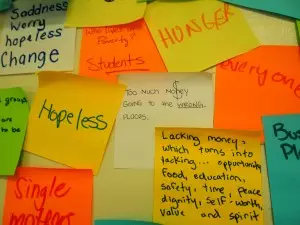*By CWP Intern Emily Shoff
Poverty: a black hole, an empty fridge, a lack of opportunity, inequality. On Tuesday, March 27th Carleton students mapped out poverty with post-its at the Take Note event. An outline of Canada rapidly filled into a colourful mosaic of post-its all responding to this central issue. One by one, students followed the colour-coded legend asking questions designed to characterize poverty. Who is poverty? Where does it live? What does it look like? Within hours, Carleton students had shared their understanding on the issue creating a collection of insight.
The event was organized as a final project of the Engage Ottawa initiative. Here at Canada Without Poverty I used my own understanding and knowledge gained from this internship to challenge and objectify the misconceptions of poverty in Canada – no poverty is not just homelessness and no it doesn’t have to be chronic.
So what is poverty? According to som e student’s post-its, it’s ‘that grinding weight’, it’s ‘the child who doesn’t know the joy of Christmas’, its ‘loneliness’, its ‘dehumanizing’, its ‘someone just like you’. Yes, poverty is homelessness, it lives under bridges and it’s a Tim Horton’s cup with change inside, but most of all its ‘intersectional’. It covers every race, gender, class and age. With examples such as the crisis in Attawapiskat and the degradation in Lower East Side Vancouver, it is clear some populations are more vulnerable to poverty, those being Aboriginal peoples, women, persons with disabilities and visible minorities.
e student’s post-its, it’s ‘that grinding weight’, it’s ‘the child who doesn’t know the joy of Christmas’, its ‘loneliness’, its ‘dehumanizing’, its ‘someone just like you’. Yes, poverty is homelessness, it lives under bridges and it’s a Tim Horton’s cup with change inside, but most of all its ‘intersectional’. It covers every race, gender, class and age. With examples such as the crisis in Attawapiskat and the degradation in Lower East Side Vancouver, it is clear some populations are more vulnerable to poverty, those being Aboriginal peoples, women, persons with disabilities and visible minorities.
We need to Take Note of poverty in Canada. Only 6 provinces have a poverty strategy, meanwhile, cuts to social welfare and the record high usage of food banks (almost 900,000 Canadians needing the food bank each month) remain persistent across the country. Poverty needs to be understood as a much more encompassing issue than just homelessness. An estimated 150,000-300 000 individuals are visibly homeless with roughly 3.5 million struggling to escape the “need trap” (as one individual recalls from his own experience).

Fortunately, many Carleton students have recognized the realities of poverty in Canada, regardless of the government’s efforts to illegitimize its effects. Ehem, cuts to the National Council on Welfare (an organization that produces relevant research material on the state of poverty in Canada) and the ignorance of the Attawapiskat crisis. Carleton students have responded calling it “dehumanizing” and a “violation of human rights”.
We got the response we wanted: we sparked conversation, got people thinking, created a more fluid understanding of the issue, we asked the important questions. Students definitely had questions. We definitely had surprised looks and queried thoughts. It was all part of the project.
After the thrust of this event, I went back that night to take down the map. One by one, I pulled each post-it off dissecting every meaning, smiling because after all this energy myself and Canada Without Poverty employees strive to do; engage, educate, question, we had hundreds of post-its from all socio-economic backgrounds that became part of a collective voice.
Until the federal government adopts an official definition of ‘poverty’, we must Take Note of poverty’s all encompassing effects, pervasiveness and detriments.
**More photos were taken to capture the collective. Check them out here!


